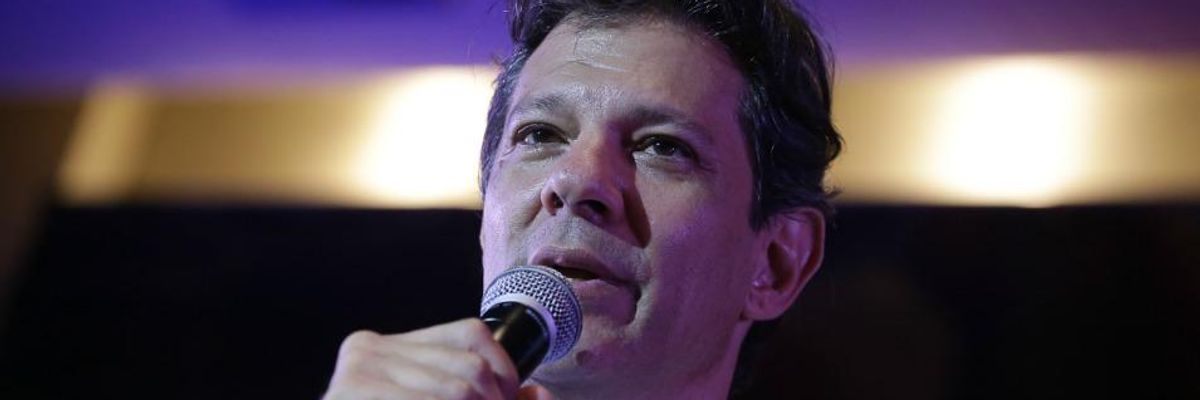Brazilian left-wing presidential candidate Fernando Haddad is demanding an investigation into an illegal campaign funded by right-wing marketing firms in support of his opponent, Jair Bolsonaro, which is making use of the messaging service WhatsApp to send anti-Haddad propaganda to millions of voters ahead of the country's election.
Brazil's largest newspaper, Folha,reported Thursday that pro-Bolsonaro entrepreneurs have spent $3.2 million purchasing bundles of local phone numbers in order to send hundreds of millions of messages to WhatsApp users featuring fake news stories about Haddad.
"My adversary is seeking to benefit from electoral crimes," Haddad tweeted after the report came out. "What we are facing here is an attempt at electoral fraud."
"While the west obsesses on the spread of disinformation via Facebook and Twitter posts, Brazil is showing that WhatsApp--which is huge in Brazil but lots of other places--can be way more powerful." --Glenn GreenwaldHaddad's Worker's Party (PT) also spoke out, calling on WhatsApp to combat the business-backed campaign.
"What is at stake here is the survival of the democratic process," said the party.
The campaign "constitutes undeclared campaign donations by companies," reported Folha, which is "outlawed by electoral legislation."
The hugely popular messaging app, which is owned by Facebook, is used by about 40 percent of Brazilians and is where about 60 percent of the country's voters get their news, according to BuzzFeed. Its messages are encrypted, making it difficult for the company to monitor what's being said among users.
As journalist and Brazil resident Glenn Greenwald wrote on Twitter, the entrepreneurs behind the campaign have been able to pose as WhatsApp users' friends when they send fake news through the app, allowing stories--like one about Haddad distributing "erotic baby bottles" to schools in an effort to combat homophobia--to reach millions of users.
A Brazilian fact-checking group, Project Eleicoes Sem Fake, found in a study of 347 public WhatsApp chat groups that almost all of the political images shared in the groups from August to October were false or misleading.
"From a sample of more than 100,000 political images that circulated in those 347 groups, we selected the 50 most widely shared," the researchers wrote in an op-ed in the New York Times this week. "Eight of those 50 photos and images were considered completely false; 16 were real pictures but used out of their original context or related to distorted data; four were unsubstantiated claims, not based on a trustworthy public source. This means that 56 percent of the most-shared images were misleading. Only eight percent of the 50 most widely shared images were considered fully truthful."
The group called on Whatsapp to restrict the number of people a single user can broadcast a message to, as well as the number of times a message can be forwarded, in an effort to mitigate the power of the fake news campaign.
The news of the business-led election-meddling follows reports that in August, Eduardo Bolsonaro, the son of the pro-torture, openly misogynist candidate, met with former Trump administration strategist Steve Bannon, who offered "internet tips, analysis, interpreting data, that type of stuff"--raising concerns that Bannon has brought his quest to help right-wing autocrats take control of the world's democracies to Brazil.
Haddad's campaign has attempted to counter the pro-Bolsonaro fake news campaign by drawing attention to his opponent's relationship with Bannon, whose appointment to President Donald Trump's White House was applauded by white supremacists.
"Steve Bannon is accused of sabotaging democratic regimes around the world. He uses fake news to spread fear and violence to win elections," the narrator in a new ad by Haddad tells viewers. "Bannon is a specialist in spreading terror around the world. Bolsonaro has spent the last 30 years doing this in Brazil."

